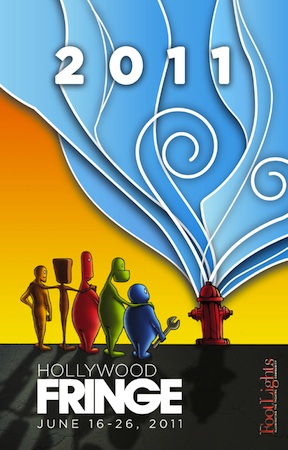
HOLLYWOOD FRINGE FESTIVAL REVIEWS 2011
[Editor’s Note: Our (either) amazing or insane (you decide) theater correspondent Tony Frankel saw somewhere in the area of 40 Fringe shows during its ten-day festival; we’re pretty sure no one else exceeded that. Although the Fringe is now over, some of the shows that were featured have kept going past the festival’s end; those shows are reviewed elsewhere with their own individual reviews. What follows here are individual reviews of the shows that were contained within the festival. They are all on a single long web page. To see a specific review, click on a title below and you will jump to it.]
A MESS OF THINGS: A NEW DOCUMENTARY MUSICPLAY
ANOTHER EFFING FAMILY DRAMA
BE CAREFUL! THE SHARKS WILL EAT YOU!
COWBOY MOUTH
DEITY CLUTCH
EVOLUTION OF A KISS
FIVE UNEASY PIECES
FREAKSHOW DELUXE
GIRL BAND IN THE MEN’S ROOM
GROUP
LOST MOON RADIO
MAIZY: A FABLE
MARTINI AND OLIVE: TORN BETWEEN TWO LOVE HANDLES
MY MOBSTER
PORTER’S MACBETH
SMOKE AND MIRRORS
SPRING AWAKENING
STEAL AWAY: THE LIVING HISTORY OF HARRIET TUBMAN
THE BARKING PIG
THE DUMB WAITER
THE MILFORD PROJECT
THE NEXT BEST THING
THE SEX LIFE OF ACHILLES
 A Mess of Things: A New Documentary Musicplay
A Mess of Things: A New Documentary Musicplay
TRUE INVENTION
Adam Tinkle’s solo intermedia performance piece is about his peculiar father, Ben, who is forced to move out of his house of fifty years; the problem is that Ben has tinkered on more inventions than Thomas Edison, hoarding bits of every project in the basement. After the detritus is tossed into storage units, Mr. Tinkle recorded his family members and their feelings regarding this accrual of rubbish’¦or is it a treasure?
The influence of Ira Glass’ This American Life are evident in these audios, wherein splices of family dialogue reveal more about the American way of consumerism and storage than any commentator could. The influence of The Books is also evident when Mr. Tinkle stands before a microphone and accompanies his own folk-like, sometimes chaotically structured songs and text with guitar and saxophone (The Books and their “collage music” are nearly indescribable – they are an American duo who perform acoustic folk melodies with vocals and digitally processed sound).
 In A Mess of Things, sound artist Tinkle’s poetic creations (along with an occasional wry comment) are effectively sparse, counterbalancing the subject of stockpiling that we hear on the interspersed family recordings. The influence of “multimedia opera pioneer” Laurie Anderson is equally evident as Tinkle combines all of these elements with a television set that transmits scenes from nature. His show is self-admittedly a bit like all of these artists, and while Tinkle is still tinkering with the invention of his own wholly unique style, the gentle simplicity of what he calls a “videographically illuminated radio opera” and “a looping folk fable of memory, repetition and hoarding” sheds a cathartic light on a complex issue.
In A Mess of Things, sound artist Tinkle’s poetic creations (along with an occasional wry comment) are effectively sparse, counterbalancing the subject of stockpiling that we hear on the interspersed family recordings. The influence of “multimedia opera pioneer” Laurie Anderson is equally evident as Tinkle combines all of these elements with a television set that transmits scenes from nature. His show is self-admittedly a bit like all of these artists, and while Tinkle is still tinkering with the invention of his own wholly unique style, the gentle simplicity of what he calls a “videographically illuminated radio opera” and “a looping folk fable of memory, repetition and hoarding” sheds a cathartic light on a complex issue.
The show is more of a meditation than an entertainment – those who need a barrage of stylistic brouhaha in order to pay attention may have a tough time understanding this most fascinating artist. But if you actively listen, you will be rewarded with a keen understanding of the addiction to consumerism and the inability to dissociate from material possessions – a uniquely American disease. Tinker’s show was a welcome respite from the manic tomfoolery and assault of so many Fringe entries.
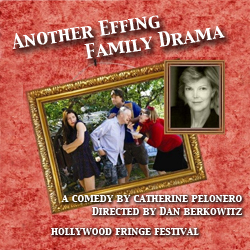 Another Effing Family Drama
Another Effing Family Drama
THE DEATH OF A DEATH OF A SALESMAN PARODY
In Another Effing Family Drama, playwright Catherine Pelonero had the idea to spoof the kitchen sink variety of family dramas, but instead of concocting a compelling story in which her stock characters are blatantly aware of their dysfunctions, she merely presents a repetitive drone of a piece that is silly and sophomoric. Even if you are familiar with the plays that she pokes fun at, the thinly drawn characters merely comment on their situation – making for poor satire (the joke where a delivery man actually delivers a kitchen sink falls flat because the sink serves no other purpose; it’s a punch line with no set-up). This structure leaves the actors floundering in an attempt to flesh out characters; the most successful being Monica Martin as a trashy, trumpet-blowing alcoholic. Pelonero is advised to re-visit O’Neill, Williams, Miller, et al, and create a strong story first, and then craft the satire around that. This is why satire is extremely difficult to manifest – you have to be as serious with your subject matter as the plays which are being parodied. Unfortunately, not a recommended show.
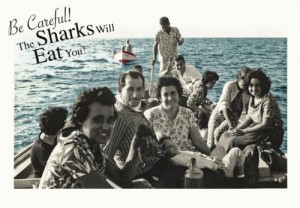 Be Careful! The Sharks Will Eat You!
Be Careful! The Sharks Will Eat You!
A ONE MAN CUBAN REVOLUTION
Just when I thought I was burnt out on autobiographical solo shows, Jay Alvarez comes along and, slowly at first, manages to capture the experience of his family’s perilous escape from Castro’s 1964 Cuba with such heartrending power that 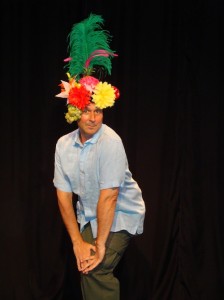 we are amazed at what lengths some people will go to for freedom and, most importantly, how Americans take our freedom for granted. It is masterful storytelling, too, as Alvarez interweaves the history of Cuba, interviews with his father, immigration issues, and a thesis on self-identification. The visuals Alvarez conjures up with his insightful writing saw Non-Cuban members of the audience openly weeping throughout the play, alongside empathetic laughter. My concern is that Alvarez’ fascinating show may get lost in the morass of one-person plays – this story needs to be seen by huge audiences.
we are amazed at what lengths some people will go to for freedom and, most importantly, how Americans take our freedom for granted. It is masterful storytelling, too, as Alvarez interweaves the history of Cuba, interviews with his father, immigration issues, and a thesis on self-identification. The visuals Alvarez conjures up with his insightful writing saw Non-Cuban members of the audience openly weeping throughout the play, alongside empathetic laughter. My concern is that Alvarez’ fascinating show may get lost in the morass of one-person plays – this story needs to be seen by huge audiences.
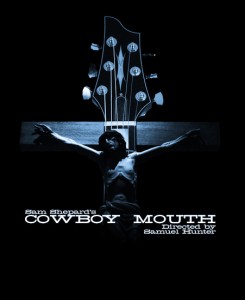 Cowboy Mouth
Cowboy Mouth
DOWN IN THE MOUTH
As impressed as I am with the commitment, passion and vision of the UC San Diego grads involved with the production of Sam Shepard’s existential one-acter Cowboy Mouth, I found myself distracted – and ultimately exhausted – by the over-enthusiastic acting and direction. Shepard’s 1971 play is an autobiographical account of the brief and torrid affair he had with singer Patti Smith, who not only co-wrote the piece, but starred in the original production with Shepard himself. The play hit so close to home for Shepard that he bolted after one performance to reunite with his wife.
Cowboy Mouth is a brutal examination of an affair – an affair that may not have occurred as a love connection, but as a tool to fill life’s eternal voids. The glaringly self-indulgent script vacillates between naturalism and poetry; it is filled with metaphors and symbols (such as a dead crow for a pet) which are generated from insider info that would go over the head of most audiences: One character is a Lobster Man, who is based on French Poet Gerard de Nerval’s pet lobster, one that he took for daily walks (Smith claims that she was born on the day that Nerval hung himself). Also, the title Cowboy Mouth is taken from a Bob Dylan song, and Dylan lived at the Chelsea Hotel where the incendiary affair took place.
 For the play to resonate as a theatrical experience, the actors – in this case, Justin O’Neill as Slim and Claire Kaplan as Cavale – need to do some seriously layered work. But the manic direction by Samuel Hunter kept the hard-working actors so busy that internalized choices of character came off as an afterthought. As such, the vocal deliveries were often shrill: screaming does not intensify the language, it only serves to distance us from the absurdist/poetic dialogue. I’m shocked to see the word “nuance” used in some of the reviews on the Fringe Site, for the production, as a whole, had about as much nuance as a stampede. In fact, a violent and frenetic dance piece opens the show, leaving both actors nowhere to go – they’re out of breath and distractingly sweaty from the get-go. If such a “dance” is added, why not stylize it in, say, Kabuki?
For the play to resonate as a theatrical experience, the actors – in this case, Justin O’Neill as Slim and Claire Kaplan as Cavale – need to do some seriously layered work. But the manic direction by Samuel Hunter kept the hard-working actors so busy that internalized choices of character came off as an afterthought. As such, the vocal deliveries were often shrill: screaming does not intensify the language, it only serves to distance us from the absurdist/poetic dialogue. I’m shocked to see the word “nuance” used in some of the reviews on the Fringe Site, for the production, as a whole, had about as much nuance as a stampede. In fact, a violent and frenetic dance piece opens the show, leaving both actors nowhere to go – they’re out of breath and distractingly sweaty from the get-go. If such a “dance” is added, why not stylize it in, say, Kabuki?
The most interesting moments came when the dust settled and the actors caught their breath; both lead actors clearly have the ability to tap into their internal life, but their technique is way too raw, forced and unpolished, as is the direction of Samuel Hunter. Certainly, there was some good work (especially Ms. Kaplan and the quiet intensity of Spencer Howard as the Lobster Man), but a violent production of a violent play in a tiny space only substantiates the notion of many an acting teacher: Keep it Simple.
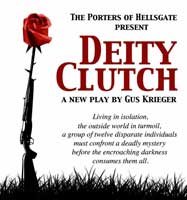 Deity Clutch
Deity Clutch
TALK ABOUT THE TROUBLE WITH WORDS!
While playwright Gus Kreiger may be having a lexicological field-day with his new script Deity Clutch, his thesaurus-consulting word-play becomes the undoing of his post-apocalyptic tale – for although we are smitten with how much fun he is having with the English language, the verbosity trumps story and character development.
Interestingly enough, I entered the theatre one minute after the show began and spent the entire first act wondering how the author had managed to disseminate all of his exposition in that first minute. The style, at first, is decidedly theatre of the absurd (both Beckett and Stoppard come to mind); Kreiger is at his best with the creation of existential repartee. The style than jarringly shifts to a mock Elizabethan with some sci-fi George Lucas thrown in, and it soon becomes apparent that the script is a labyrinthine journey down a rabbit hole of ideas, leaving his audience in the dizzying dark. The basic structure of a story lies buried beneath the explosion of words – that of a group of people who have holed themselves up in a mansion to protect themselves from “The Outsiders” (whoever they are), but members of the group begin to disappear and no one knows who to trust. It’s a terrific idea, but really, we walked out of the theatre feeling slimed by vowels and consonants.
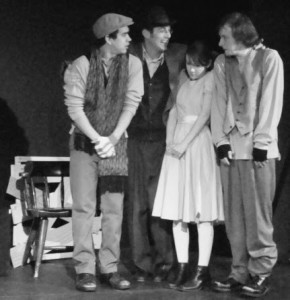 I suspect that some theatregoers may be so impressed with Kreiger’s assemblage of three-syllable words that they may not notice how challenged the actors are with the complicated language. The acting, by the way, ranges from glorious to flat, largely due to the stylistic discrepancies in the script.
I suspect that some theatregoers may be so impressed with Kreiger’s assemblage of three-syllable words that they may not notice how challenged the actors are with the complicated language. The acting, by the way, ranges from glorious to flat, largely due to the stylistic discrepancies in the script.
I love the Porters of Hellsgate, but why choose a huge undertaking such as this to showcase at the Fringe? Yes, Kreiger is the Associate Artistic Director and Head of New Works, but someone should have said, “Gee, Gus, maybe you spent too much time playing Dungeons and Dragons, because much of the dialogue sounds like a video game.” This Fringe outing was a repeat engagement for The Porters of Hellsgate and they may yet do it again (hell, very few of the young companies are listening to critics, anyway). If that happens, I recommend it to any young practitioner of the theatre: you may feel alienated but never bored, and you will see a perfect example of a playwright who is too clever by half. Hopefully, budding playwrights will learn that the story must be crafted first, and then you can have all the fun you want tweaking the language.
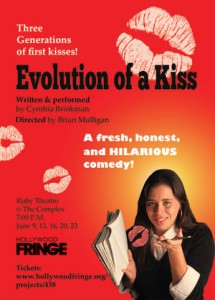 Evolution of a Kiss
Evolution of a Kiss
BÉSAME MUCHO
Cynthia Brinkman is an extremely engaging and endearing actress who successfully manages to create 3 generations of Latina women and their rite-of-passage involving a first kiss. Brinkman also wrote the piece, which is based on authentic entries in journals from her mother and grandmother. The scenes work particularly well, and Brinkman’s expressions are priceless. Her comedy is most organic and never forced.
However, I am not a huge fan of solo shows with characters that break the fourth wall and speak to the audience. I believe the show would be even stronger if Brinkman did not ask us if we know what certain words are in Spanish, but rather let the words speak for themselves in the scenes. She is adept enough at creating characters and deftly moving from one to the other, so what is the purpose of talking to the crowd?  It feels like Ms. Brinkman is asking us, “Do you like me? Do you really like me?” Yes, we do. As it stands, however, Evolution of a Kiss is entertaining and fun; it even conjured up memories of my own awkward teenage years (are there any other kind?)
It feels like Ms. Brinkman is asking us, “Do you like me? Do you really like me?” Yes, we do. As it stands, however, Evolution of a Kiss is entertaining and fun; it even conjured up memories of my own awkward teenage years (are there any other kind?)
I must state that there is genuineness about Brinkman – an openness and goodness – that shines through in her performance. She appears to be a lovely and gracious lady – you will not be sorry to have spent time with her.
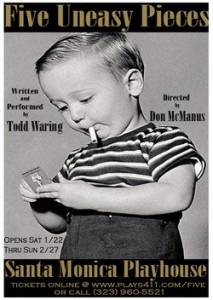 Five Uneasy Pieces
Five Uneasy Pieces
HE MAKES IT LOOK UNEASY
Had I not been supremely entertained and enthused by Todd Waring’s Five Uneasy Pieces, I would have been consumed with jealousy over the consummate acting skills he employs. Doubly remarkable is that Waring writes monologues with such authenticity that his six distinct characters seem to be speaking off-the-cuff. With just a button of a shirt or the addition of a vest, Waring adroitly melts from an old southern woman to an Australian art teacher; a has-been English theatre critic to a gangbanger grappling with internalized homophobia; and a Heart of Darkness-like special ops leader in Afghanistan. Each monologue may have shock value, but Waring deserves each seat-squirming moment because his expertise in character development makes them well-earned. The acting is rich and focused, utilizing incredible space work, complex mannerisms, and master dialects. The play shows off Waring’s talents, but he’s not showing off; instead, he relishes moments and allows his creations to breath. This is a classically-trained actor with a fascinating internal engine; you would have to search well to find better acting in the entire Hollywood Fringe Festival.
 The anxiety that these mini-plays may create is smoothed out by swing bassist Edwin Livingston, who makes the minimalist settings come alive. After the titular monologues, we are treated to the astounding mimicry of some Jacques Brel wannabe – Waring’s Robert Clary-esque vibrato alone is worth the visit and the mini-concert was hilarious (my French-speaking companion surprised me with the news that Mr. French was not actually speaking French, they were nonsense syllables).
The anxiety that these mini-plays may create is smoothed out by swing bassist Edwin Livingston, who makes the minimalist settings come alive. After the titular monologues, we are treated to the astounding mimicry of some Jacques Brel wannabe – Waring’s Robert Clary-esque vibrato alone is worth the visit and the mini-concert was hilarious (my French-speaking companion surprised me with the news that Mr. French was not actually speaking French, they were nonsense syllables).
Because this play obviously showcases Waring’s insanely good talent, some may label this enterprise a “showcase.” But unlike other showcases that serve no other purpose than to parade people who would have been better left at home, Five Uneasy Pieces is a celebration of the craft of acting. And what’s wrong with that?
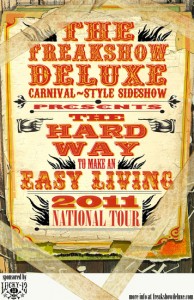 Freakshow Deluxe
Freakshow Deluxe
DON’T TRY THIS AT HOME (OR IN A THEATRE, FOR THAT MATTER)
OK, who doesn’t love a freak show? There is no denying the thrill of watching folks walk on glass, pierce their bodies, lie down on a bed of nails or swallow sharp objects. For a break in the department of self-mutilation, why not throw in a card trick or two?
The reason that I attended this entertainment oddity was its status as Winner of the 2010 Hollywood Fringe Festival’s Award for Best Cabaret/Circus (a category that was changed to The Fringe Award for Cabaret & Variety this year – which is a shame because the Best Circus award at the Fringe would have gone to the way that the awards were handed out’¦but that’s another story).
 This “Carnival-Style Sideshow” is based on the “Ten-in-One” sideshow, a sequence of acts that include Born Freaks (people with physical deformities, such as The Elephant Man), Made Freaks (such as tattooed or extremely obese people), and a variety of stunts and magic. In the Dustbowl of 1920’s Oklahoma, with no TV or movie theatres, this shit must have been killer. But this is 2011, and all we have to do is turn on the internet for a display of thousands of freaks, from David Blaine to Tom Green to Sarah Palin.
This “Carnival-Style Sideshow” is based on the “Ten-in-One” sideshow, a sequence of acts that include Born Freaks (people with physical deformities, such as The Elephant Man), Made Freaks (such as tattooed or extremely obese people), and a variety of stunts and magic. In the Dustbowl of 1920’s Oklahoma, with no TV or movie theatres, this shit must have been killer. But this is 2011, and all we have to do is turn on the internet for a display of thousands of freaks, from David Blaine to Tom Green to Sarah Palin.
Perhaps it’s because I am sitting in a theatre, but this oddity of a diversion has about as much theatricality as a Little Rascals backyard entertainment. Any great act, magician or freak is all about the build-up. Because Freakshow Deluxe changes artists with any given performance, there is no way for them to construct a solid, steady show, even though most of these folks are the real thing. Apparently, the ringleader who normally introduces acts was off freaking somewhere else, so the replacement, a little person, inadequately delivered poorly written introductions.
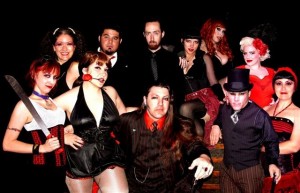 Except for the astoundingly fabulous piano player (the deadpan Brother Daniel the Demented, who also composed and recorded the fun theme song), this show was freaky boring: the audience had to be constantly reminded to applaud for the acts, and the entire proceeding lacked an air of suspense, mystery and creepiness. The audience members are the ones who must go from pain to resistance to extraordinary flexibility to buy this as a theatrical entertainment.
Except for the astoundingly fabulous piano player (the deadpan Brother Daniel the Demented, who also composed and recorded the fun theme song), this show was freaky boring: the audience had to be constantly reminded to applaud for the acts, and the entire proceeding lacked an air of suspense, mystery and creepiness. The audience members are the ones who must go from pain to resistance to extraordinary flexibility to buy this as a theatrical entertainment.
 Girl Band in the Men’s Room
Girl Band in the Men’s Room
STRAIGHT FLUSH
On the precipice of what may be a lucrative recording contract, four female musicians, in a backstage men’s bathroom, get ready for a gig. In Robert Ford’s very promising short play, these girls are about to discover the communion and friction inherent in a musical group.
Whether or not Girl Band in the Men’s Room can be developed into a grown-up play remains to be seen, but Ford’s script is rife with playful, pitch-perfect patois, evoking the 90s alternative rock/grunge scene without romanticizing it. Updating this piece to modern times would be a mistake, as part of its appeal is the clash of ideals at a time when polarized politics became the norm. Clinton represented  possibilities for the future (especially to the younger set), but the chains of 1980s American Family Values kept America shackled to the past. Therefore, Kurt Cobain’s 1994 demise, which casts a shadow over the Girl Band, is a perfect metaphor for the times: his death spoke to fame, rebellion, religion, drug use, and following one’s vision – all of which are motifs in the play. The experience is also nostalgic, largely because we don’t have to think about piracy, bootleg downloads, and American Idol. As such, the story is a universal voyage of discovery which ruminates on timely and universal themes: women seeking influence in a man’s world; disparate actions and motivations toward a common goal; and the balancing act between self-expression, art and business. Each character shines with diversity (not the skin color, but personality – these chicks (as cast) are white and blond),
possibilities for the future (especially to the younger set), but the chains of 1980s American Family Values kept America shackled to the past. Therefore, Kurt Cobain’s 1994 demise, which casts a shadow over the Girl Band, is a perfect metaphor for the times: his death spoke to fame, rebellion, religion, drug use, and following one’s vision – all of which are motifs in the play. The experience is also nostalgic, largely because we don’t have to think about piracy, bootleg downloads, and American Idol. As such, the story is a universal voyage of discovery which ruminates on timely and universal themes: women seeking influence in a man’s world; disparate actions and motivations toward a common goal; and the balancing act between self-expression, art and business. Each character shines with diversity (not the skin color, but personality – these chicks (as cast) are white and blond),  but it is the actresses (Erin Boyes, Kat Primeau, Katherine Skelton and Lisa Summerscales) who bring this play to life under the surehanded direction of Michael Kortlander.
but it is the actresses (Erin Boyes, Kat Primeau, Katherine Skelton and Lisa Summerscales) who bring this play to life under the surehanded direction of Michael Kortlander.
However, there are some problems: there is the opening monologue where a bandmember talks to herself like a character out of One Flew Over The Cuckoo’s Nest; the too-easy interaction with a guy who comes in for a pee, and the lack of discovery – these chicks seem to know themselves and each other a little too well. Maybe some shocking revelations? I’m rooting for this show and the newly formed producers, Dirtie Blonde Productions.
 Group: A Musical
Group: A Musical
YOU’LL NEED GROUP THERAPY AFTER SEEING THIS MUSICAL
Here’s what I don’t understand: A musical premieres in Los Angeles, the reviews are encouraging BUT but loaded with caveats. Instead of tweaking the material, the creators settle with what they’ve got, blatantly disregarding the advice of the critics, and present the same troubled work about a troubled college professor who encourages his 6 troubled clients to sing their confessions, aided by a three-piece band that was hired by the professor. Miraculously, the patients and musicians come up with songs on the spot.
Here are snippets of the reviews:
– “Admittedly, each of the seven characters is someone whose story we’ve seen before, whether on stage or on the big screen or on a day-or-nighttime soap;”
– “A bit on the underdeveloped, overly familiar side;”
– “Feels precisely like a season of ’˜Glee’ jammed into a two-hour play;”
– “An uneven and intellectually ambitious musical about group therapy. Sadly, director Richard Tatum’s lackluster production is marred by flat acting and indifferent music’¦The generic-therapy conflicts strain to engender our sympathy, while the songs are a collection of slight melodies and unexceptional lyrics along the lines of, ’You’ve got your issues. Here, take a tissue;’” and
– “Appealing if unfinished experiment’¦needs a tighter story line, more surprise, and a bit of diversity to give this production the dramatic engine it needs to carry an audience through seven catharses.”
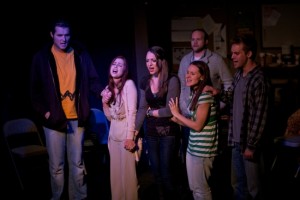 The most telling quote of all: “Here’s hoping “Group” will keep working on its issues. A breakthrough is imminent.”
The most telling quote of all: “Here’s hoping “Group” will keep working on its issues. A breakthrough is imminent.”
Instead of working on the issues, the creators decided to stage it again, publicizing the Hollywood Fringe run with deceptively positive snippets from the same reviews. But to what end? Are the creators looking for an angel before they re-work the piece? Are they hoping that this outing will garner more and better reviews so that they will win Best-of-Fringe and stage it yet again?
I suspect that the creators listened to feedback that they wanted to hear from friends, family and not-too-discerning audiences who elevate really mediocre shows into the category of brilliant (clearly because they have nothing brilliant to compare them to).
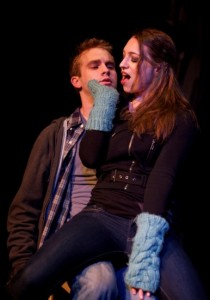 Here’s the bottom line: while I agree with a majority of the reviews cited above, Group: A Musical is a predictable, sophomoric show that wears its heart on its sleeves and strains credibility with each passing revelation. The first problem is that we’re never really on board with the concept. Next is the use of stock characters: the closeted gay guy, the cancer patient, the sexaholic, etc. The acting, although showing signs of authentic emotion, is basically overwrought. Plus, it’s only the second time in a year that I had to be talked out of bolting from a show at intermission (my theatregoing companion hated it, too, but thought that surely there must be a pay-off in Act Two – there wasn’t).
Here’s the bottom line: while I agree with a majority of the reviews cited above, Group: A Musical is a predictable, sophomoric show that wears its heart on its sleeves and strains credibility with each passing revelation. The first problem is that we’re never really on board with the concept. Next is the use of stock characters: the closeted gay guy, the cancer patient, the sexaholic, etc. The acting, although showing signs of authentic emotion, is basically overwrought. Plus, it’s only the second time in a year that I had to be talked out of bolting from a show at intermission (my theatregoing companion hated it, too, but thought that surely there must be a pay-off in Act Two – there wasn’t).
Some teary-eyed moments at the end do not justify the means, and the so-called improvised songs in Group don’t hold a candle to the truly improvised musicals of Impro Theatre or The Groundlings, to name a few.
These are exciting but scary times for the theatre: young writers and directors are loaded with talent and promise, but sorely lack guidance and mentors (which is exactly why they should listen to critics!). Audiences, like the one that jumped to its collective feet for Group, are cheating our future visionaries by making them believe that their work is great (indeed, two other friends who also rose to their feet acknowledged how misguided this show was).
My suggestion to Adam Emperor Southard, who wrote the book, music and lyrics: before you attempt to re-envision musical theatre, go back and study the works of those who did so successfully (from Hammerstein to Sondheim) and then go about deconstructing their theories. It just feels as if your work, like your characters’ songs, is being made up on the spot. I know you want to be a part of something greater. I know you’re passionate. I know you see theatre as a place for ideals and inspiration. Now, it is time for you to get really tough on yourself as an artist – writing a musical is 5% inspiration and 95% sweat.
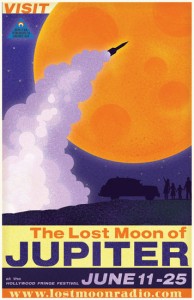 Lost Moon Radio
Lost Moon Radio
LOST’S NEW HORIZONS
It’s going to be difficult to top the excitement that was generated with Lost Moon Radio’s performance at the Hollywood Fringe. In fact, their 10th episode (entitled “Travel”) was one of the most theatrically satisfying and stimulating events of the year. To know more about the troupe, see my review of Episode 8. As promised, this turned out to be one of the most talked-about events at the Fringe. Fortunately, they’ll be performing at Best of the Fringe, so you still have a chance to see the most thrilling new troupe in town.
As I have written previously, many sketch companies have a great idea for a skit, but don’t know when to stop. Every one of the sketches is timed perfectly here. There isn’t one song or scene that fails to wholly entertain and amaze us. Because this is a radio show, our imaginations can go hog wild: inspired doesn’t begin to describe the scene where we listen to the “tape” of Jim Morrison as a tour guide at the White House, and I can actually envision a young travel guide at a brothel in Manila. All 10 performers and musicians are at the top of their game. This sterling company is not at the Fringe to find their footing – they’re here to show everyone else how perfection can be accomplished.
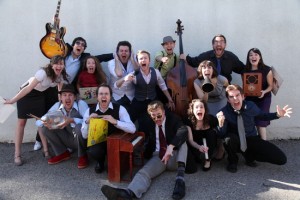 After witnessing more than a dozen excruciating new musicals this year, I can say that Lost Moon contains some of the brightest songwriting around, namely the Wine Country Rap Song, brilliantly executed by Lauren Flans (who is also a contributing writer). This astounding parody of rap is actually perfect rap – if most rap contained remarkable lyrics with this kind of execution, I would never turn off my radio. Plus (and listen up, theatre producers), the sound design by Dave McKeever is the best I have heard at any musical in any house in years: the balance between musician and singers was flawless; the sound was never cranked too high, and even when the goings on lent themselves to cacophony, I understood every word. I hope the audience understands what a glowing achievement this is. Kudos to music director Dylan Ris as well.
After witnessing more than a dozen excruciating new musicals this year, I can say that Lost Moon contains some of the brightest songwriting around, namely the Wine Country Rap Song, brilliantly executed by Lauren Flans (who is also a contributing writer). This astounding parody of rap is actually perfect rap – if most rap contained remarkable lyrics with this kind of execution, I would never turn off my radio. Plus (and listen up, theatre producers), the sound design by Dave McKeever is the best I have heard at any musical in any house in years: the balance between musician and singers was flawless; the sound was never cranked too high, and even when the goings on lent themselves to cacophony, I understood every word. I hope the audience understands what a glowing achievement this is. Kudos to music director Dylan Ris as well.
Yes, every one of the performers deserves mention, but there is a star quality to Jen Burton, who plays Nancy Wilson; she joins DJ Jupiter Jack, who broadcasts this radio program from the Orange County Fair. Most important, a thanks to producer Monica Miklas – your hard work does not go unnoticed.
If you have reviewed any other shows yourself at the Festival, you may find yourself not being so liberal with attaching five stars to your review. Five is perfection; it means the show can not get any better and I don’t hand them out often – so, five out of five stars to this outstanding corral of talent. Thank you, Lost Moon Radio – I am proud to say I knew you when!
 Maizy: A Fable
Maizy: A Fable
FAIRY BAD
Maizy: A Fable is such a misguided effort that it is almost unreviewable. The “family-friendly” story of an actress trying to make it in Hollywood is trite enough, but to have a Fairy try to make it in “Hollywoods” is trite squared (plus, do you want to explain drug use and casting couches to your children?). The writing is sophomoric and paradoxical, the acting is awful (not because of the talent itself, but because director Alexis Bloom allowed broad characterizations not even worthy of high school) and the attempt at design (such as video projections) only served to reinforce the sloppiness of the production. I wasn’t even sure what the company was  going for here: if it was to be cute, even that was not realized. This production smacks of those who have been unrealistically overpraised by family and friends and therefore never stop to think that what they are crafting is essentially an elementary school play (the producers of Maizy, Cowboys and Indians Theatre Company, won an award at last year’s Fringe). Even the promotion was all over the map, with no fewer than three separate poster cards floating around. What really gets my goat, though, were the folks in the audience who disliked the show, but gave positive reviews on the Fringe site, presumably so as not to hurt anyone’s feelings. Shame, shame, shame! Do you see what lying to your friends does to help them grow as artists? Nothing. I know this is a harsh review, but I found nothing redeeming in this production.
going for here: if it was to be cute, even that was not realized. This production smacks of those who have been unrealistically overpraised by family and friends and therefore never stop to think that what they are crafting is essentially an elementary school play (the producers of Maizy, Cowboys and Indians Theatre Company, won an award at last year’s Fringe). Even the promotion was all over the map, with no fewer than three separate poster cards floating around. What really gets my goat, though, were the folks in the audience who disliked the show, but gave positive reviews on the Fringe site, presumably so as not to hurt anyone’s feelings. Shame, shame, shame! Do you see what lying to your friends does to help them grow as artists? Nothing. I know this is a harsh review, but I found nothing redeeming in this production.
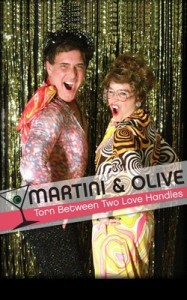 Martini and Olive: Torn Between Two Love Handles
Martini and Olive: Torn Between Two Love Handles
SHAKEN, BUT NOT STIRRING
Back in the 90s, there was a very successful musical entitled No Minimum, in which two actors spoofed lounge acts with such sincerity and restrained zaniness that we actually believed these acts to be real.
At this year’s Hollywood Fringe, Martini and Olive (played by Michael Halpin and Judy Heneghan) is an over-the-top lounge act that celebrates the silly over the authentic. Although there are moments of truly inspired lunacy (such as the Swizzle Stick Dancers’ “Popcorn” number), the clearly rehearsed mistakes, pratfalls and asides verged on the inane. As such, it felt like a Saturday Night Live sketch that wore out its welcome. Of course, there was remarkable talent on board: 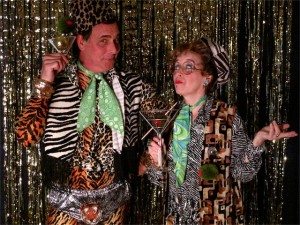 clever medleys, terrific costumes and funny choreography kept our attention, but there was little in the way of intelligent satire. It was a bludgeoning of glitter and polyester.
clever medleys, terrific costumes and funny choreography kept our attention, but there was little in the way of intelligent satire. It was a bludgeoning of glitter and polyester.
There ain’t nothin’ wrong with cheesy fun – would that the direction were more sophisticated and that the set-ups weren’t loaded with incongruencies (this obviously horrible act has two security guards blocking the audience from them?). This was exactly the kind of show one would see at a Cabaret in the 1980s, which is fine, but in a theatre setting, I wish that Martini and Olive had played against type. If they don’t, I fear it’s a lifetime of Fringe for this very, very silly outing.
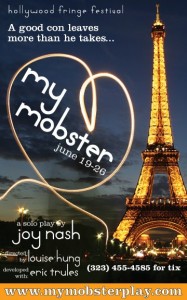 My Mobster
My Mobster
C’EST MAGNIFIQUE
I agree with the subtitle of Joy Nash’s outstanding My Mobster, which is simply “A Solo Play.” This is not a solo “show,” “outing,” or “performance piece.” It is a well-crafted play that demonstrates what is missing from most solo performer’s autobiographical accounts: storytelling as the epic side of truth and wisdom. But Nash is not just a wonderful writer – she is a vulnerable, engaging and strong performer who deftly bounces from character to character. Even with a slew of technical mishaps at the performance I saw, Nash never became rankled. Her style is breezy and fluid, but never inauthentic. Her true account of a relationship with a  charming liar who romances her in Venice and Paris is sure to conjure up the crazy relationships we have all had in the search for love and acknowledgement. Nash was also wise to let herself be lovingly guided by director Louise Hung.
charming liar who romances her in Venice and Paris is sure to conjure up the crazy relationships we have all had in the search for love and acknowledgement. Nash was also wise to let herself be lovingly guided by director Louise Hung.
Here’s the kicker: for 90 transporting minutes, I never looked at my watch once. Do you know what a huge compliment that is? This is what theatre is all about: a compelling, transformative and entertaining experience that leaves us examining our own choices through another character’s journey. Well done!
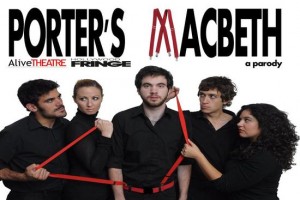 Porter’s Macbeth
Porter’s Macbeth
A PRODUCTION THAT COULD USE SOME RITALIN
Porter’s Macbeth is a one-hour retelling of Shakespeare’s Scottish Play from the viewpoint of Porter, a minor character who is the gatekeeper at Macbeth’s home. Turner Munch’s rapid-fire and inventive direction will surely make this a crowd pleaser, especially for those who accept stylized histrionics and zany antics in lieu of character development and story. Munch surely accomplished his goal of creative and heightened physicality, and there were some truly inspired bits, but his style overtook substance, especially when the hyper and occasionally unfocused high school-like proceedings verged on the annoying and inaccessible.
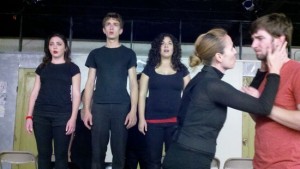 For over 30 years, I have been adjudicating High School Shakespeare Festivals wherein students are assigned a Shakespeare play and have 8 to10 minutes to present an ensemble piece (monologues are 3 to 5 minutes). Because there are rules banning costumes, props, etc., school kids more or less cram an entire play into 10 minutes with such rapidity that it would make the speed of light pale by comparison. Although the scenes elicit non-stop chuckles from fellow schoolmates, judges are often annoyed by the slamming metal chairs, interminable screeching and broad character portrayals, which were all evident in Porter’s Macbeth. When actors take on a persona, such as the Three Witches, they often render the language unintelligible, which also happened in Porter’s Macbeth. Judges are forever grateful at the school festivals when a scene appears that is not based on manic physicality, but internalized performances.
For over 30 years, I have been adjudicating High School Shakespeare Festivals wherein students are assigned a Shakespeare play and have 8 to10 minutes to present an ensemble piece (monologues are 3 to 5 minutes). Because there are rules banning costumes, props, etc., school kids more or less cram an entire play into 10 minutes with such rapidity that it would make the speed of light pale by comparison. Although the scenes elicit non-stop chuckles from fellow schoolmates, judges are often annoyed by the slamming metal chairs, interminable screeching and broad character portrayals, which were all evident in Porter’s Macbeth. When actors take on a persona, such as the Three Witches, they often render the language unintelligible, which also happened in Porter’s Macbeth. Judges are forever grateful at the school festivals when a scene appears that is not based on manic physicality, but internalized performances.
 This is not to say that such scenes can not be funny or entertaining, for they allow the actors to become the setting of the story. It is always amusing to watch actors become furniture, doors, trees, or ships, utilizing sound effects and a Capella singing to create a mood. This style of theatre is based on the improvisational techniques (later called Theatre Games) of Viola Spolin, who is single-handedly responsible for the world of Improvisational Theatre as we know it today, teaching at Second City in Chicago. Second City was founded by her son, Paul Sills, as a place where scenes and story were created using techniques that grew out of Spolin’s teaching.
This is not to say that such scenes can not be funny or entertaining, for they allow the actors to become the setting of the story. It is always amusing to watch actors become furniture, doors, trees, or ships, utilizing sound effects and a Capella singing to create a mood. This style of theatre is based on the improvisational techniques (later called Theatre Games) of Viola Spolin, who is single-handedly responsible for the world of Improvisational Theatre as we know it today, teaching at Second City in Chicago. Second City was founded by her son, Paul Sills, as a place where scenes and story were created using techniques that grew out of Spolin’s teaching.
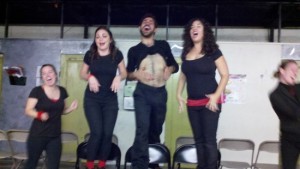 These games were designed to help actors focus and unleash creative choices. They are crazy fun to execute, and can often be very funny to watch – but just for a while. Even the best improvised scene can become grating on the nerves. This is why the form of theatre Mr. Munch is taking on needs to incorporate the nutty shenanigans into the story, not the other way around. Actors need to slow down and enunciate, more drama is needed to break up the monotony of the movement and, most importantly, please stop slamming those metal chairs – we want to be disquieted by the story, not the noise.
These games were designed to help actors focus and unleash creative choices. They are crazy fun to execute, and can often be very funny to watch – but just for a while. Even the best improvised scene can become grating on the nerves. This is why the form of theatre Mr. Munch is taking on needs to incorporate the nutty shenanigans into the story, not the other way around. Actors need to slow down and enunciate, more drama is needed to break up the monotony of the movement and, most importantly, please stop slamming those metal chairs – we want to be disquieted by the story, not the noise.
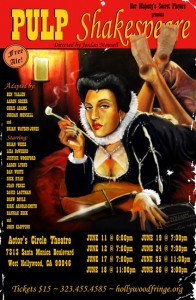 Pulp Shakespeare
Pulp Shakespeare
BUT LO!
Two Huzzahs Up for Pulp Shakespeare, an inspired Elizabethan-styled adaptation of Tarantino’s classic film, Pulp Fiction. Even though your experience may be heightened if you have seen the film, it is not a prerequisite. How in the world did five adapters work together to come up with this magnificently funny and entertaining script? This show is not a parody of Tarantino or the Bard, but rather an homage to scribes who celebrate the richness, variance, and complexity of language. The creators wisely removed or combined scenes from the movie and are encouraged to go even further in that direction (hopefully with the endorsement of Tarantino himself).
Not only has director Jordan Monsell (who adapted with Ben Tallen, Aaron Greer, Chris Adams and Brian Watson-Jones) managed to keep up the pace, but some of his actors enter the realm of amazing. Dan White plays Julius (aka Jules, the Sam Jackson role) with thunderous clarity – I am honored to have been in the presence of such a magnificent portrayal: fiery, classical and grounded, Mr. White exemplifies the vocal technique missing in so many modern actors – namely enunciation and diction. Truly, a bravura performance.
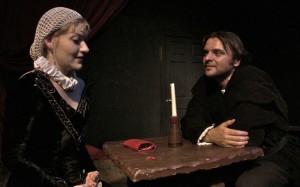 Aaron Lyons is Vincent de la Vega (the Travolta role), who is much less presentational than Julius. Except for the greasy haircut, there was no mimicking of Travolta; Mr. Lyons created a fully-fleshed character of his own. Hannah Beck as Lady Mia Wallace is lovely. The scenes in the diner (remember Amanda Plummer and Tim Roth?) are made all the more thrilling, exciting and hysterical with Liza de Weerd as Meadsweet (Yolanda) and Brian Weiss (Pumpkin Pie). Also notable is Drew Doyle as Sir “Butch” Coolidge.
Aaron Lyons is Vincent de la Vega (the Travolta role), who is much less presentational than Julius. Except for the greasy haircut, there was no mimicking of Travolta; Mr. Lyons created a fully-fleshed character of his own. Hannah Beck as Lady Mia Wallace is lovely. The scenes in the diner (remember Amanda Plummer and Tim Roth?) are made all the more thrilling, exciting and hysterical with Liza de Weerd as Meadsweet (Yolanda) and Brian Weiss (Pumpkin Pie). Also notable is Drew Doyle as Sir “Butch” Coolidge.
Of course, Pulp Shakespeare is a little rough around the edges, namely in the splicing of scenes and some lesser acting, but I consider this show (along with Lost Moon Radio) as simply the best to have come out of the Hollywood Fringe. Would that I did not have so many other shows to cover, I would see this again in a Shakespearean second.
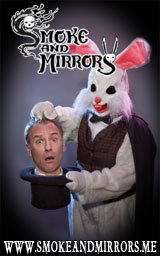 Smoke and Mirrors
Smoke and Mirrors
TRICKY MATERIAL
To compensate for his boyhood loneliness and fears, Albie Selznick would hole himself up and diligently practice the art of prestidigitation. In the opening scene of his highly uneven autobiographical solo illusionist show, Smoke and Mirrors, Mr. Selznick effectively conveys the pathos of a sad, young man who is desperately trying to become something special so as to fill the void of a fatherless existence. He deftly intermingles past and present by showing off his extraordinary sleight-of-hand skills while recreating the bedroom of his youth, screaming down to his nagging mother that he is going to bed. Aided by eerie original music by Johnnie Gee Griffing and focused direction by Bettina Zacar, we are immediately excited and on board with this accomplished actor/magician and his trained pigeons.
Soon, however, it becomes apparent that Mr. Selznick has taken on too much. The show we are promised at the top – that of a performer who uses his art to deal with his personal demons – quickly degenerates into a round-the-world memoir, including a long and astoundingly incongruous section in which Mr. Selznick becomes a martyr to his own generosity involving a pair of tickets to Phantom of the Opera in London. What happened to the magic? Why are we introduced to Mr. Selznick’s wonderful capabilities, only to not have them incorporated in this story? And is Mr. Selznick really related to the famous movie producer, as he purports in his story, or did he make that up to secure theatre tickets from Cameron Mackintosh’s office? We want to know the secret of that trick.
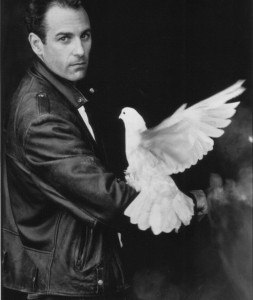 There is some good writing, and Selznick is quite personable, but his own script needs a much stronger through-line, not to mention a dramaturg (is Selznick riffing on his own script, or does it really have words such as “cause,” “um” and “ya know”?). As it stands, the magician’s journey lacks insight and humor, eschewing profundity for a bunch of non-related stories (“facing the fears” doesn’t hold as a motif because Mr. Selznick comes off as a fearless performer who easily walks on stilts and juggles bowling pins).
There is some good writing, and Selznick is quite personable, but his own script needs a much stronger through-line, not to mention a dramaturg (is Selznick riffing on his own script, or does it really have words such as “cause,” “um” and “ya know”?). As it stands, the magician’s journey lacks insight and humor, eschewing profundity for a bunch of non-related stories (“facing the fears” doesn’t hold as a motif because Mr. Selznick comes off as a fearless performer who easily walks on stilts and juggles bowling pins).
The direction and the show become sloppier, evidenced by the lag time in-between stories and the five-foot bunny assistant who seems to have a great deal of trouble seeing out of its bunny mask. (I believe the big bunny represents Mr. Selznick’s fears, but it comes off more comical than nightmarish.)
I sorely miss Matt Marcy’s Disillusioned – Confessions of a Serial Magician, seen last year. Marcy weaved tidbits about himself throughout his performance – concentrating on self-deprecation, a lot of humor and even more magic; we left Marcy’s performance enthralled, entranced and engaged. Not so with Mr. Selznick, who needs to dig deeper and re-write his script as a play, versus the one-man reminiscence that it is now. While some audience members may be satisfied with the lack of magic, others will surely see that it really is all smoke and mirrors.
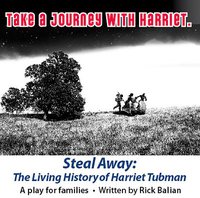 Steal Away: The Living History of Harriet Tubman
Steal Away: The Living History of Harriet Tubman
A SERIOUS SUBJECT DESERVES A MORE SERIOUS TREATMENT
Subtitled A Play for Families, writer/director Rick Balian’s Steal Away neither delves deeply enough into the subject matter of Harriet Tubman nor uses anything more than Sandra Eckert’s magnificent puppets to engage the kids in the house. It underestimates what youngsters can handle by treating the subject of slavery with such a laid-back style, that we are never truly engrossed or 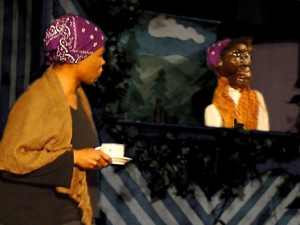 inspired. As such, it feels less like theatre and more like a puppet show geared to fit in a half-hour break at an elementary school (we even get an apple after the show!). Pamela Shaddock is luminous as the famous leader for the Underground Railroad and the ever-reliable Skip Pipo adds classiness to his portrayal of a slew of white-folk, while Taji Coleman and David Hunter, Jr. bring the well-crafted puppets to life. I’ve seen National Park Rangers bring a family audience to tears with nothing more than a photo of Tubman, brutally honest storytelling and a wide-brimmed hat; having Harriet teach us “Let My People Go” after Steal Away ends only serves to further diffuse the drama of the story, it doesn’t bring us any closer to it. The legacy of the slave’s escape to the North deserves a more powerful incarnation than this.
inspired. As such, it feels less like theatre and more like a puppet show geared to fit in a half-hour break at an elementary school (we even get an apple after the show!). Pamela Shaddock is luminous as the famous leader for the Underground Railroad and the ever-reliable Skip Pipo adds classiness to his portrayal of a slew of white-folk, while Taji Coleman and David Hunter, Jr. bring the well-crafted puppets to life. I’ve seen National Park Rangers bring a family audience to tears with nothing more than a photo of Tubman, brutally honest storytelling and a wide-brimmed hat; having Harriet teach us “Let My People Go” after Steal Away ends only serves to further diffuse the drama of the story, it doesn’t bring us any closer to it. The legacy of the slave’s escape to the North deserves a more powerful incarnation than this.
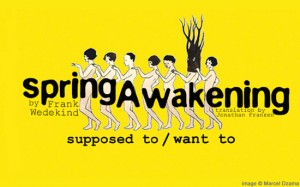 Spring Awakening
Spring Awakening
THE BLOOM FADES FAST
About fifteen minutes into Spring Awakening, it seemed a possibility that this would be the show to talk about at the Fringe. Directors Dana Murphy and Patrick Riley used every inch of The Complex Hollywood’s Ruby Theatre, including the aisles and backstage; the staging simply blazed with imagination and wonder. There was a palpable sense of excitement in the theatre as we watched the troubled teens of Frank Wedekind’s 1906 play deal with their burgeoning sexuality in a repressed society. Patrick Riley and Jennifer Allcott lead an enthusiastic, unbridled and passionate cast. It seemed like a fascinating idea to have the actors who portrayed the adults wear masks, signifying the profound disconnection between generations. Jonathon Franzen’s translation is fluid, poetic and accessible.
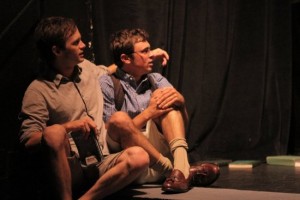 However, the performances and the staging had a manic quality to them, which slowly began to drown out the excitement: some performances verged on presentational or forced (some actors simply yelled and screeched) when nuance was called for. The masks, which had made a bold statement at first, soon separated the audience from the emotional impact of the story – especially in a scene where one of the students is put on “trial” for teaching another student about sex.
However, the performances and the staging had a manic quality to them, which slowly began to drown out the excitement: some performances verged on presentational or forced (some actors simply yelled and screeched) when nuance was called for. The masks, which had made a bold statement at first, soon separated the audience from the emotional impact of the story – especially in a scene where one of the students is put on “trial” for teaching another student about sex.
As is sometimes the case with youthful companies, mania replaces subtlety; fresh exuberance is exciting at first, but too much high energy can be lulling to our senses. We, the audience, have to shut down a little to take in so much. Hence, the creators of Spring Awakening are urged to abandon some of the theatrical devices, such as the masks, and focus on the internal psychology of the piece. Wedekind’s story is chockablock with layers of character development that were left largely unexplored in this production. 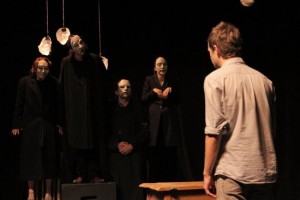 The actors must internalize their emotions and do what they can to hide the characters’ struggles from us. There was a sense that this crew may have been raised in an era of such permissiveness that the concept of a truly harsh and repressive society seemed foreign to them.
The actors must internalize their emotions and do what they can to hide the characters’ struggles from us. There was a sense that this crew may have been raised in an era of such permissiveness that the concept of a truly harsh and repressive society seemed foreign to them.
Those who have reviewed this show are clearly excited by the same things that excited me. But for the show to resonate, clever staging and fresh talent can not replace what we need most: a heightened emotional truth that still feels authentic. The directors are encouraged to keep up the wonderful staging; now they must dig into their work internally as much as they do externally.
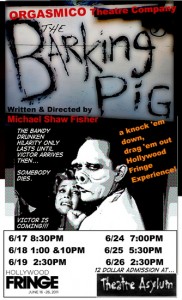 The Barking Pig
The Barking Pig
PROMISING SCRIPT? MAYBE. BUT WITH A PRODUCTION LIKE THIS’¦
Had someone other than playwright/director Michael Shaw Fisher helmed his new play The Barking Pig, it may have been easier to ascertain if the script even has potential. Ultimately, Mr. Fisher can not be dismissed as a writer – in fact, his script barks with potential, but his direction lacks nuance and focus.
The idea is superb: seven unique characters (who just happen to come together in a small town bar at the same time) receive a phone call from escaped convict Victor Helms, announcing his plans (via a creepy, piggy poem) that he is on his way to murder one of the patrons. While waiting for the porcine Godot, Fisher’s characters take us on an existential journey that is occasionally funny, but enigmatic and, ultimately, annoying. 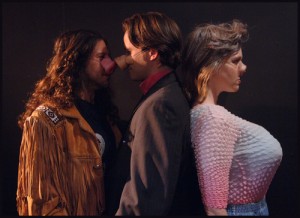 There is a mish-mash of styles on hand – including horror, sci-fi, thriller, and theatre-of-the-absurd – that are all fascinating arenas to explore in a dusty old bar, but most of the acting is pushy, inauthentic, loud, and belongs in a sketch comedy show, not a play. If we don’t believe them, how are we to believe the dialogue?
There is a mish-mash of styles on hand – including horror, sci-fi, thriller, and theatre-of-the-absurd – that are all fascinating arenas to explore in a dusty old bar, but most of the acting is pushy, inauthentic, loud, and belongs in a sketch comedy show, not a play. If we don’t believe them, how are we to believe the dialogue?
When the performing was professional, the play took on a much-needed air of seriousness. Teresa Wierzbianska, who played Izzy, picked up a guitar late into the proceedings and began to sing: it is a voice that literally makes one sit up and take notice; her voice is unique, dusky, strong, earthy, and powerful – I advise anyone to remember her name. (Sadly, her acting chops are not as strong – this is, after all, her very first play). J. Scott finally arrives as Victor, proving that a wonderful portrayal can make Fisher’s other-worldly dialogue more than palatable, it can be downright exciting.
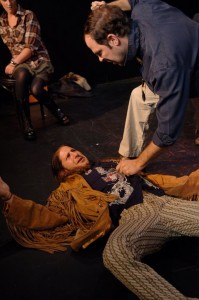 Frankly, Thom Vacca, who portrays the town Sheriff, personifies why we wish The Barking Pig had ended much sooner: he has no internal life whatsoever, and does not make choices conducive to creating a character. (One line saying that the Constable is fat does not justify that big pillow stuffed into his shirt – Vacca didn’t even bother to physicalize the corpulence of his character.) The other actors vacillated between some interesting choices and campy; and have I mentioned how much I love actors who raise their vocal decibels higher than that of sandblasting to achieve emotion?
Frankly, Thom Vacca, who portrays the town Sheriff, personifies why we wish The Barking Pig had ended much sooner: he has no internal life whatsoever, and does not make choices conducive to creating a character. (One line saying that the Constable is fat does not justify that big pillow stuffed into his shirt – Vacca didn’t even bother to physicalize the corpulence of his character.) The other actors vacillated between some interesting choices and campy; and have I mentioned how much I love actors who raise their vocal decibels higher than that of sandblasting to achieve emotion?
This is a perfect show for a Fringe Festival: for very little financial investment, Mr. Fisher can rest assured that he has talent as a writer and a great idea to pursue. But he is neither a theatre director nor a casting director yet. This script needs to be taken more seriously – as do the entire proceedings. In fact, we are encouraged to take a swig of our own beverages (not included) every time someone on the stage says, “To Jake!” This makes me wonder if Mr. Fisher wants to stay on the fringe, performing for inebriated college students. It is advised that he check-in with himself and hone his vision as an artist.
And if I didn’t make myself clear: I want to see this play again, so please find a different director and some seasoned actors.
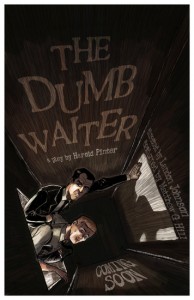 The Dumb Waiter
The Dumb Waiter
DUMBFOUNDED
In the “What Were They Thinking?” department, this Dumb Waiter, Harold Pinter’s one-act masterwork, was placed not in England, but in America. Words such as “lorry” and dialogue such as “light the kettle” are therefore rendered incongruous. It came to my attention that this production had planned on re-writing the script for Depression-Era America, but could not secure the rights to do so. As such, they left it in America with American accents, but kept the British dialogue unchanged.
YOU WERE GOING TO RE-WRITE PINTER?! Every silence-filled pause, every barb is there for a reason. The personalities of two lower-class criminals who wait for their next hit – the anticipation, the boredom, the anger – are all tied to language. The setting for the one-act is fantastic: a small room that has the 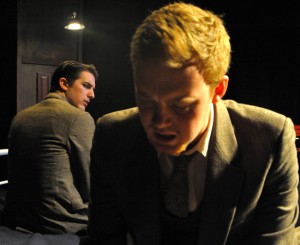 audience sitting single-file in-the-round. Within 30 seconds, however, we know there will be little nuance from the actors; their looks, shrugs and breathing all felt pre-determined and predictable. Then they start speaking in “American” dialect, and this version becomes tension-free, boring and downright infuriating. It’s no wonder that these actors weren’t listening to each other – we couldn’t listen to them either. This outing has showcase written all over it – if the creators had put as much thought into the production as they did into their thesis of a press release, we may have had something.
audience sitting single-file in-the-round. Within 30 seconds, however, we know there will be little nuance from the actors; their looks, shrugs and breathing all felt pre-determined and predictable. Then they start speaking in “American” dialect, and this version becomes tension-free, boring and downright infuriating. It’s no wonder that these actors weren’t listening to each other – we couldn’t listen to them either. This outing has showcase written all over it – if the creators had put as much thought into the production as they did into their thesis of a press release, we may have had something.
Really, avoid this one at all costs. In fact, avoid reading this review as well.
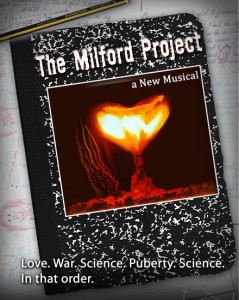 The Milford Project
The Milford Project
ON THE RIGHT TRACK
The Milford Project may be a mixed bag, but I recommend it for one main reason: belly laughs! There were some truly inspired moments of hysterical lunacy in this espionage parody musical about a science fair, nuclear bombs, spies and first love. The music, although jaunty and fun, is a bit repetitive in its structure, but there are some inspired lyrics. (The actors must project more to be heard over the musicians: please, more soft pedal on the piano and more brushes on the drums!)
Matthew Boehm gives a stellar performance as Richie, the Science Fair whiz kid – he really mines some comic gems. Tracy Podell has some choice moments as his lab assistant/love interest Penny (would that she had a more powerful singing voice, however).
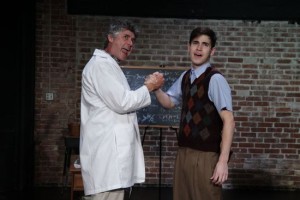 This high-camp show was handed over to a cast that often pushes way too hard for laughs; camp, like farce, must be played seriously or it can become numbing. As such, the show feels somewhat convoluted by the end, and could use some judicious cutting. But just as I felt like the show was losing me, a moment would come along that still makes me laugh when I think about it. This is a Urinetown/25th Annual Putnam County Spelling Bee/Re-Animator-esque outing that definitely is a promising musical.
This high-camp show was handed over to a cast that often pushes way too hard for laughs; camp, like farce, must be played seriously or it can become numbing. As such, the show feels somewhat convoluted by the end, and could use some judicious cutting. But just as I felt like the show was losing me, a moment would come along that still makes me laugh when I think about it. This is a Urinetown/25th Annual Putnam County Spelling Bee/Re-Animator-esque outing that definitely is a promising musical.
 The Next Best Thing
The Next Best Thing
SEDENTARY STORYTELLING
There is no doubt that Antonio Sacre is a gifted and compelling storyteller: I am sure that he could create an engaging piece about reading the morning paper. In The Next Best Thing, a relationship that goes from Chicago to New York to Hollywood is examined with bittersweet clarity. It fascinates how Mr. Sacre is able to incorporate other themes along the journey, but the piece overall feels languid and lacks an urgency that is most necessary to bring the story to life. Even with a fascinating use of language, this solo outing was delivered as if  we were having a cup of coffee at a diner, instead of using the stage as a vehicle to heighten the emotion and characters in the story. It starts out promising enough, but Paul Stein’s direction has the poor actor sitting in a chair for most of the piece. Perhaps this style of staging works best in a public school classroom, where Mr. Sacre also performs, but a theatre demands better use of the space. Certainly not a waste of your time, but it is ultimately a lukewarm experience, largely because the artist and director haven’t found the focus of the play – his relationship itself appears to be the centerpiece, but the storyteller’s addition of his journey to enlightenment detracts us from the meat of the story.
we were having a cup of coffee at a diner, instead of using the stage as a vehicle to heighten the emotion and characters in the story. It starts out promising enough, but Paul Stein’s direction has the poor actor sitting in a chair for most of the piece. Perhaps this style of staging works best in a public school classroom, where Mr. Sacre also performs, but a theatre demands better use of the space. Certainly not a waste of your time, but it is ultimately a lukewarm experience, largely because the artist and director haven’t found the focus of the play – his relationship itself appears to be the centerpiece, but the storyteller’s addition of his journey to enlightenment detracts us from the meat of the story.
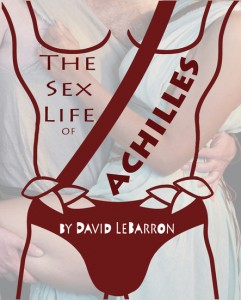 The Sex Life of Achilles
The Sex Life of Achilles
IT’S ALL GREEK TO ME
Winner of Stage and Cinema’s best program at the Fringe (not play, the actual program) goes to The Sex Life of Achilles: presented as a papyrus scroll, it describes a lengthy Who’s Who of Ancient Greece with a Greek Active/Passive bent, such as “Patroclus: Achilles’ super sexy lover and kissing cousin,” “Priam: King of Troy, old as shit, lots of kids,” “Zeus: Father and King of the Gods, man-whore” and “Hera: His meddling wife, Goddess of Prop 8.”
It’s a perfect introduction to David LeBarron (self-titled Priest of Thetis) and his play The Sex Life of Achilles, because we never know whether to take this over-the-top, overwrought artist seriously. His retelling of the Iliad is actually quite well written and is most fascinating when delving into the complex stories of Greek mythology. He plays Achneanus, a 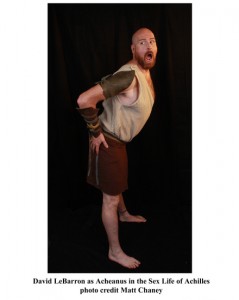 courier who retells Achilles’ story to Thetis (Rebecca Norris, who delivers most of her lines as if she were warming up for a performance at The Met). He is ably assisted by Briseis (played by the lovely, wry, and Amazonian Shanna Beauchamp) while Thetis basically lays on pillows for the entire hour as the other two bicker about how the story should be told. To say that it gets confusing is an understatement, as more names are introduced than a roster at Ellis Island, and LeBarron’s performance is so superciliously silly, tramping around the stage like a gay dinner party host who isn’t prepared for his guests’ arrival, that it’s impossible to buy his bout with serious acting in the latter part of the piece.
courier who retells Achilles’ story to Thetis (Rebecca Norris, who delivers most of her lines as if she were warming up for a performance at The Met). He is ably assisted by Briseis (played by the lovely, wry, and Amazonian Shanna Beauchamp) while Thetis basically lays on pillows for the entire hour as the other two bicker about how the story should be told. To say that it gets confusing is an understatement, as more names are introduced than a roster at Ellis Island, and LeBarron’s performance is so superciliously silly, tramping around the stage like a gay dinner party host who isn’t prepared for his guests’ arrival, that it’s impossible to buy his bout with serious acting in the latter part of the piece.
tonyfrankel @ stageandcinema.com
The Second Annual Hollywood Fringe Festival ran from June 16-26, 2011.
For further information, visit http://www.hollywoodfringe.org/
